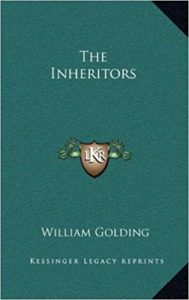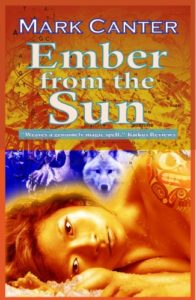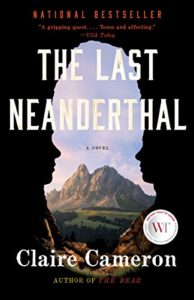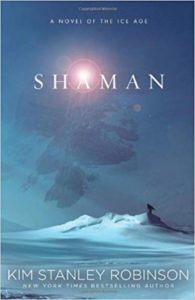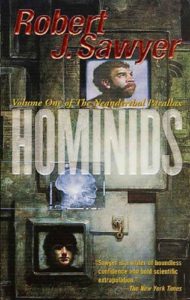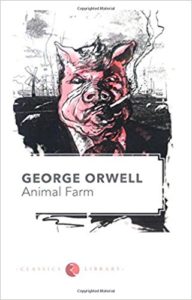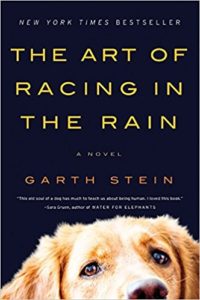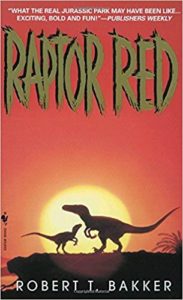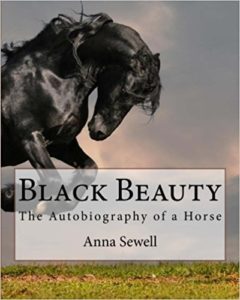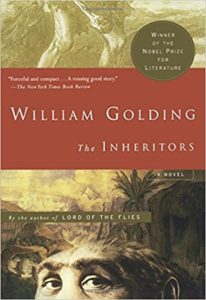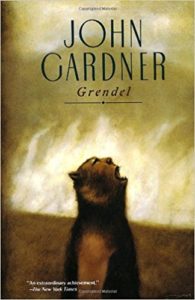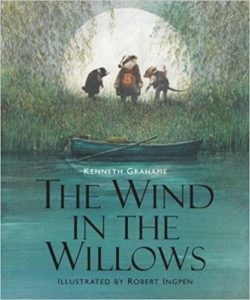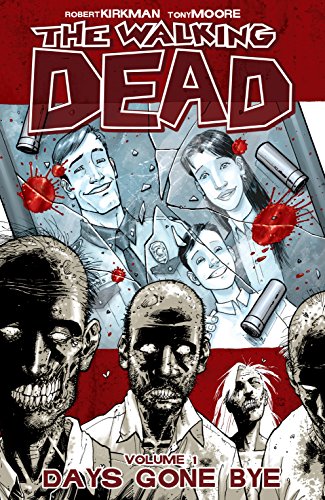 Since the first post in this series was about a book published almost forty years ago, I thought the second post should feature something more contemporary from the speculative fiction genre.
Since the first post in this series was about a book published almost forty years ago, I thought the second post should feature something more contemporary from the speculative fiction genre.
I try not to make assumptions about what my followers already know about any book or graphic novel I blog about, so I’ll summarize The Walking Dead in one spoiler-free sentence for anyone who isn’t familiar with it:
After waking up from a coma, a police officer must find his missing family and adjust to a world that has somehow become overrun with zombies while he was unconscious.
Obviously, there’s a lot more going on this world, but that sentence will give you the gist of it.
As a fair warning, the graphic novels as well as the TV show based on them are both incredibly violent. I actually had to stop reading and watching both of them a while ago due to this, although I’m still intrigued by the characters Robert Kirkman first created in 2003 and the assumptions he made about what life would be like in this sort of world.
If zombies and post-apocalyptic worlds are things you enjoy reading about, here are some other books that might be equally appealing.
Some of these titles have popped up in many similar lists online, but I’ve come up with a few classic novels I thought would work as well because of how many themes they share with this series.
Humans have dealt with plagues for millennia. For most of that time, we didn’t know why someone would seem to be perfectly healthy one day only to become dangerously ill the next. You might be surprised to see how many similarities there are between an outbreak of cholera or rabies and a zombie infestation.
What happens when a society breaks down is another string connecting all of these recommendations. While I tend to have a much more optimistic view of how the average person would behave in that situation, not every writer agrees with that. It’s always interesting to see more pessimistic takes on the topic.
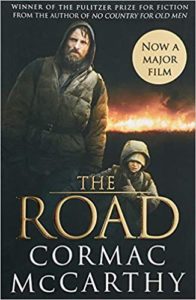 The Road by Cormac McCarthy
The Road by Cormac McCarthy
Imagine trying to stay alive in a world where nothing grew anymore. Now picture doing it while raising a child by yourself.
The relationship between the main character and his son reminded me a lot of how Rick Grimes interacted with his son in The Walking Dead. Both of these parents had been pushed to their limits by worlds they couldn’t possibly have predicted or prevented. Their love for their children was what kept them going in impossible situations.
Fair warning: this is a pretty violent story. Be sure to read some full reviews of it before checking it out if you’re sensitive to or triggered by acts of violence.
Lord of the Flies by William Golding
In this tale, a group of schoolboys were stranded on a deserted island after a plane crash. They needed to figure out how to survive there without any adult supervision for a long period of time.
This was one of the first classics I thought about after I discovered the zombie genre. True, there weren’t any monsters on the island, but the unstable, dangerous community these kids developed reminded me a lot of how many living characters behave in typical zombie movies.
If only William Golding were still alive. I’d sure like to see what he thought of the similarities between this book and today’s horror movies.
World War Z: An Oral History of the Zombie War by Max Brooks
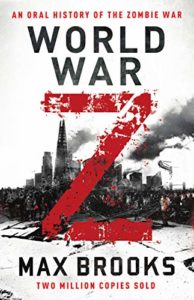 Zombies attacked. Humans fought back. Eventually, society stabilized enough for researchers to begin collecting stories from the survivors of this apocalypse.
Zombies attacked. Humans fought back. Eventually, society stabilized enough for researchers to begin collecting stories from the survivors of this apocalypse.
I liked this more hopeful approach to how people might respond to a zombie invasion. People banded together in many of the anecdotes the narrator collected, and not all of them were the folks you might necessarily expect to make alliances with one another. Some characters also survived circumstances that seemed like they should never have worked out okay in the end. It wasn’t all doom and gloom.
Oh, and do not watch the film based on this book. The only things it shared in common with the original version were the title and the fact that zombies exist in both universes.
Yes, I might still be a little vexed about that.
Rabid: A Cultural History of the World’s Most Diabolical Virus by Bill Wasik, Monica Murphy
If you think about it, rabies shares many similarities with whatever virus, bacteria, plot hole, or magical disease that creates zombies depending on which universe we’re talking about.
This disease is spread through bites and scratches.
Once symptoms appear, death is certain.
People and animals unlucky enough to be infected with it become agitated and unpredictable.
Sometimes I wonder if rabies was one of those real-life diseases that encourages creative minds to come up with fictional versions of it. They certainly have enough in common for me to think this is a likely explanation for at least some of the zombie folklore out there.
Y: The Last Man by Brian K. Vaugh
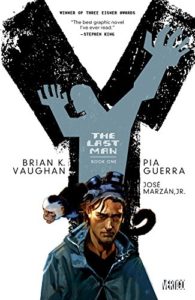 This is one of those graphic novels that I keep waiting for Hollywood to discover and turn into a TV series. It was a post-apocalyptic story what happened to the world after a virus killed off all but one man on Earth while leaving everyone who had two X chromosomes unaffected.
This is one of those graphic novels that I keep waiting for Hollywood to discover and turn into a TV series. It was a post-apocalyptic story what happened to the world after a virus killed off all but one man on Earth while leaving everyone who had two X chromosomes unaffected.
It was much less violent than The Walking Dead has been so far, but humanity still had to figure out how it was going to survive in the longterm. Since even frozen sperm and male embryos died out in this plague, humanity would only continue to exist for at most another century if the characters couldn’t figure out a way to create the next generation without the help of the Y chromosome.
Most of the storyline dealt with the main character’s quest to travel to the other side of the globe and find his estranged girlfriend. That journey was far from an easy one, but it did introduce the audience to all sorts of interesting characters along the way.
The Plague by Albert Camus
This tale was written at a time when epidemics happened more often than they do in most countries today. I’ve read that Camus was influenced by the Cholera outbreaks that happened both in the setting of this novella as well as closer to home. While the storyline doesn’t mention this disease by name, it does give clues that this might be what was killing off the characters so quickly.
If you’re not familiar with Cholera, know that it’s a bacteria that causes such severe, persistent diarrhea that people die of dehydration. In short, it is an awful way to die, and the plot did go into detail about what happens to the human body after being exposed to this illness. (So maybe don’t read this while eating lunch….)
Like fictional zombie diseases, Cholera didn’t have a cure and was poorly understood. I’m not surprised Camus was inspired to write about it. It struck communities without warning and spread like wildfire through fecally contaminated water and food. Seeing how the main character reacted to an illness that no one could stop reminded me so much of Rick Grimes’ reaction to the many deaths he saw while trying to survive in a zombiepocalypse.
What other books should be added to this list? Have you read any of these titles?
Previous posts in this series:

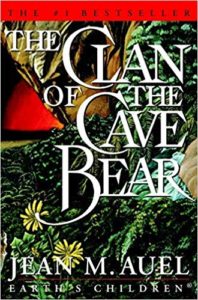 The Clan of the Cave Bear is a prehistoric novel written by Jean M. Auel in 1980 about an orphaned human girl named Ayla who was raised by Neanderthals. It has four sequels about Ayla’s life as an adult.
The Clan of the Cave Bear is a prehistoric novel written by Jean M. Auel in 1980 about an orphaned human girl named Ayla who was raised by Neanderthals. It has four sequels about Ayla’s life as an adult.